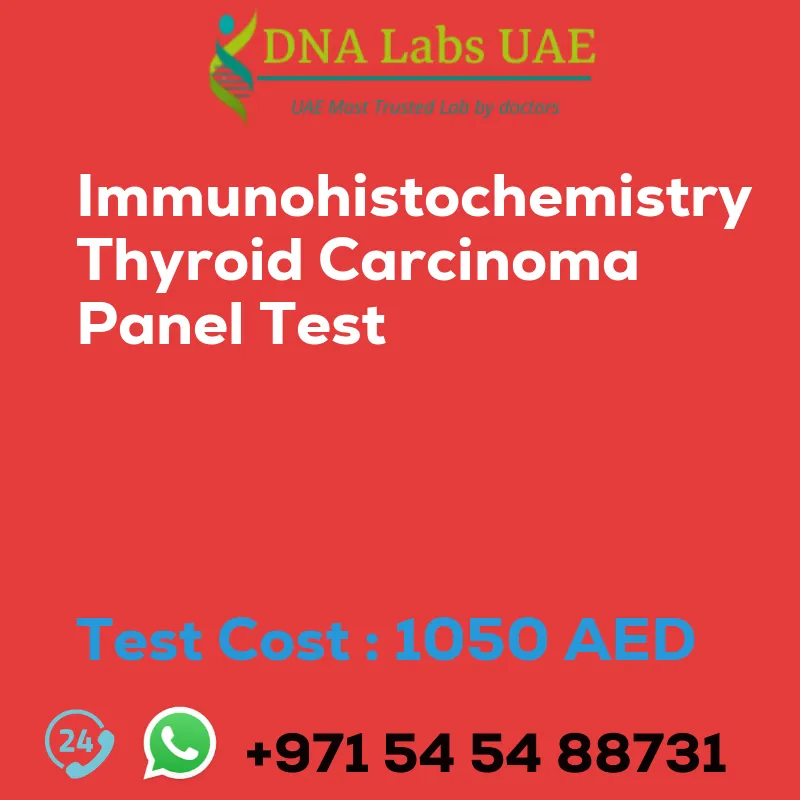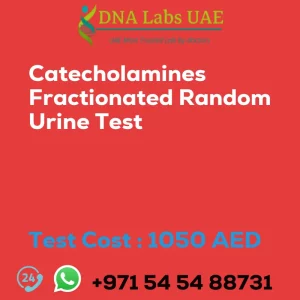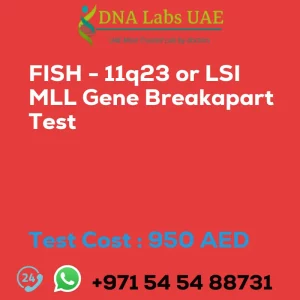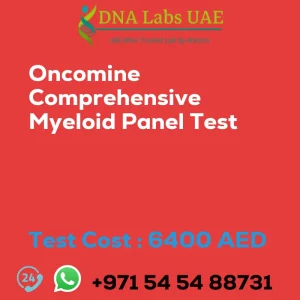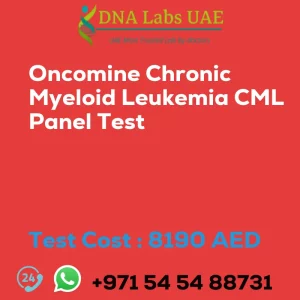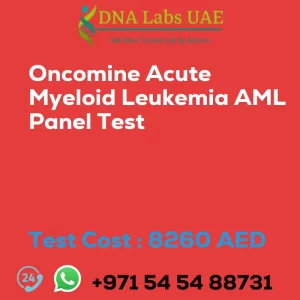IMMUNOHISTOCHEMISTRY THYROID CARCINOMA PANEL Test
At DNA Labs UAE, we offer the IMMUNOHISTOCHEMISTRY THYROID CARCINOMA PANEL test, a diagnostic tool used to determine the presence and characteristics of thyroid carcinoma, a type of cancer that affects the thyroid gland.
Test Components
- CK-19
- HBME-1
- BRAF
- Calcitonin
- Synaptophysin
- Thyoglobulin
- PTF-1
Price
1050.0 AED
Sample Condition
Submit tumor tissue in 10% Formal-saline OR Formalin fixed paraffin embedded block. Ship at room temperature. Provide a copy of the Histopathology report, Site of biopsy, and Clinical history.
Report Delivery
- Sample: Daily by 6 pm
- Report Block: 5 days
- Tissue Biopsy: 5 days
- Tissue large complex: 7 days
Method
Immunohistochemistry
Test Type
Cancer
Doctor
Oncologist
Test Department
HISTOLOGY
Pre Test Information
Provide a copy of the Histopathology report, Site of biopsy, and Clinical history.
Test Details
The IMMUNOHISTOCHEMISTRY THYROID CARCINOMA PANEL test is a diagnostic tool used to determine the presence and characteristics of thyroid carcinoma, a type of cancer that affects the thyroid gland. This panel test involves the use of immunohistochemistry, a technique that utilizes specific antibodies to detect and visualize specific proteins in tissue samples.
The antibodies used in this panel are specific to markers that are commonly expressed in thyroid carcinoma. The panel typically includes the following markers:
- Thyroid transcription factor-1 (TTF-1): TTF-1 is a nuclear protein that is expressed in normal thyroid tissue and is often used as a marker for thyroid carcinoma.
- Thyroglobulin: Thyroglobulin is a protein that is produced by normal thyroid cells and is typically elevated in thyroid carcinoma.
- Calcitonin: Calcitonin is a hormone that is produced by certain thyroid cells, and elevated levels can be indicative of medullary thyroid carcinoma.
- PAX8: PAX8 is a transcription factor that is expressed in thyroid follicular cells and is often used as a marker for thyroid carcinoma.
By analyzing the expression of these markers in tissue samples, pathologists can determine the presence and type of thyroid carcinoma. This information is crucial for guiding treatment decisions and predicting patient outcomes.
| Test Name | IMMUNOHISTOCHEMISTRY THYROID CARCINOMA PANEL Test |
|---|---|
| Components | *CK-19*HBME-1*BRAF*Calcitonin*Synaptophysin*Thyoglobulin*PTF-1 |
| Price | 1050.0 AED |
| Sample Condition | Submit tumor tissue in 10% Formal-saline OR Formalin fixed paraffin embedded block. Ship at room temperature. Provide a copy of the Histopathology report, Site of biopsy and Clinical history. |
| Report Delivery | Sample Daily by 6 pm; Report Block: 5 days Tissue Biopsy: 5 days Tissue large complex : 7 days |
| Method | Immunohistochemistry |
| Test type | Cancer |
| Doctor | Oncologist |
| Test Department: | HISTOLOGY |
| Pre Test Information | Provide a copy of the Histopathology report, Site of biopsy and Clinical history. |
| Test Details |
The IMMUNOHISTOCHEMISTRY THYROID CARCINOMA PANEL test is a diagnostic tool used to determine the presence and characteristics of thyroid carcinoma, a type of cancer that affects the thyroid gland. This panel test involves the use of immunohistochemistry, a technique that utilizes specific antibodies to detect and visualize specific proteins in tissue samples. The antibodies used in this panel are specific to markers that are commonly expressed in thyroid carcinoma. The panel typically includes the following markers: 1. Thyroid transcription factor-1 (TTF-1): TTF-1 is a nuclear protein that is expressed in normal thyroid tissue and is often used as a marker for thyroid carcinoma. 2. Thyroglobulin: Thyroglobulin is a protein that is produced by normal thyroid cells and is typically elevated in thyroid carcinoma. 3. Calcitonin: Calcitonin is a hormone that is produced by certain thyroid cells, and elevated levels can be indicative of medullary thyroid carcinoma. 4. PAX8: PAX8 is a transcription factor that is expressed in thyroid follicular cells and is often used as a marker for thyroid carcinoma. By analyzing the expression of these markers in tissue samples, pathologists can determine the presence and type of thyroid carcinoma. This information is crucial for guiding treatment decisions and predicting patient outcomes. |

